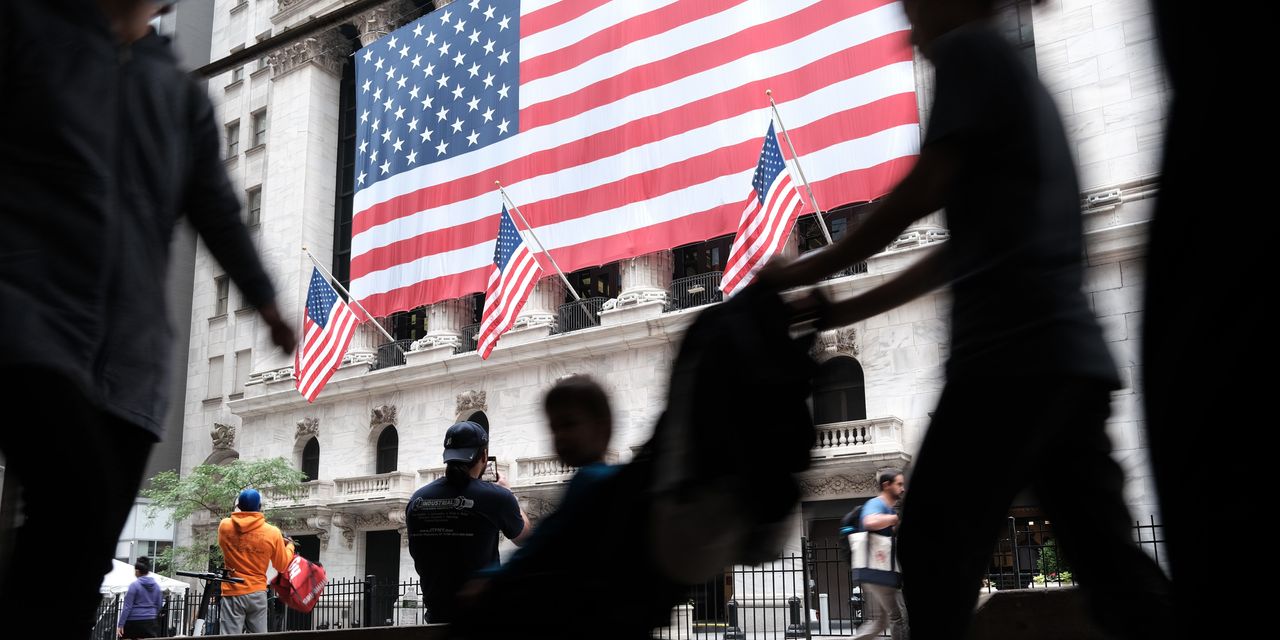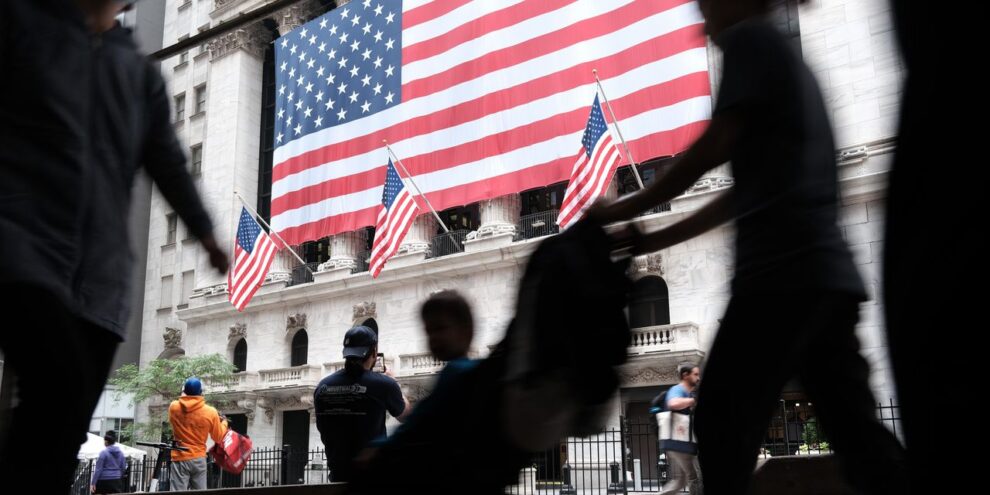
Financial markets convulsed on Monday as investors considered the prospects of U.S. inflation accelerating, not decelerating, after the release of May’s consumer-price index report.
Signs of the sentiment shift since Friday’s data release were evident in the fast-paced tightening of financial conditions, plus an outlook for more aggressive Federal Reserve rate hikes.
Gains in the two-year Treasury yield, which reflect expectations for more aggressive Fed tightening, outpaced those of the 10-year rate earlier on Monday. That caused the spread between the two rates, a widely followed indicator of the economic outlook, to briefly shrink to the brink of inversion — pointing to a rising probability of recession over the next two years, said Brett Ryan, a senior economist at Deutsche Bank Securities.
In addition, the 2y1y forward real rate, a measure of medium-term expectations for how restrictive the stance of monetary policy may be relative to inflation, has risen above 1% for the first time since 2018, Ryan said via phone. All of these bond market signals are negative for risk assets, he said.
The sharp selloff in stocks also continued, with the Dow industrials’ dropping as much as 900 points at one point on Monday and the S&P 500 trading in bear-market territory. Though the jury is out on whether the U.S. can avert an economic downturn, some see a recession likely arriving sooner than many expect.
Danielle DiMartino Booth, former adviser to ex-Dallas Fed President Richard Fisher, says she has little doubt that the U.S. has already entered into a recession and the only question is “the length and depth of the current contraction.”
May’s CPI report, which showed the annual U.S. inflation rate rising to 8.6% from 8.3% in April, has turned into a multi-day trading event ahead of this week’s meeting of Fed officials, who have delivered just two rate hikes in this tightening cycle with a third likely on the way Wednesday. As of Monday, traders of fed funds futures were pricing in a 29% chance of a jumbo-size 75 basis point hike in two days, up from 3.1% a week ago, according to the CME FedWatch Tool.
“After the latest inflation print for April, there was some hope that inflation was decelerating, but now the market is pricing in some acceleration of inflation leading to some aggressive views on Fed rate hikes,” said Jeff Spiegel, the U.S. head of BlackRock Megatrend, International and Sector ETFs. “It’s always hard to call a bottom, but we do expect continued volatility around inflation and, in the face of that, investors are going to want to find ports in the storm.”
In a phone interview, Spiegel cited the infrastructure sector, represented by funds such as the iShares U.S. Infrastructure ETF IFRA, -3.80% and iShares Global Infrastructure ETF IGF, -3.06%, as one place that will prove to be resilient in the face of high inflation and continued market volatility.
See also: BlackRock isn’t buying the dip as volatility climbs in sinking stock market
At Deutsche Bank Securities, Ryan said that “our fundamental call is that the economy will enter recession by the end of next year — though the sharp tightening of financial conditions, including Treasury yield curve flattening, adds to the risk that a recession may start sooner,” he said via phone. “The Fed has to tighten more aggressively at a faster pace than we have seen in many decades, bringing the yield curve closer to inversion — the traditional warning signal.”
“The most important thing to look at is credit spreads,” Ryan said. “With real rates and real forward rates rising meaningfully into positive territory, it indicates that the market is expecting monetary policy may have to be restrictive for longer in order to contain inflation. That, in turn, will weigh on risk assets as the likelihood of recession rises and investors demand a higher risk premium to own corporate bonds relative to Treasuries.”
“To the extent that we are getting faster tightening of financial conditions, that raises the probability of a recession happening sooner,” Ryan said. “If you keep going at this pace, in terms of risk assets selling off, it will create a feedback loop into business and consumer activity. Consumers may feel less wealthy and businesses may become more cautious about the economic outlook as borrowing costs rise too quickly. These are the channels through which an overtightening of financial conditions results in a pullback in the real economy. Businesses see borrowing costs rise sharply and start to slow hiring and investment. Consumers feel less wealthy and become more cautious on spending.”
As of Monday afternoon, all three major U.S. stock indexes were sharply lower. Dow industrials DJIA, -2.02% were down by more than 650 points, while the S&P 500 SPX, -2.93% and Nasdaq Composite COMP, -3.70% were lower by 3% and 3.6% respectively. Meanwhile, most Treasury yields moved above the 3.2% level and the spread between the 2- and 10-year rates briefly shrunk to as low as 0.24 basis points earlier in the day.









